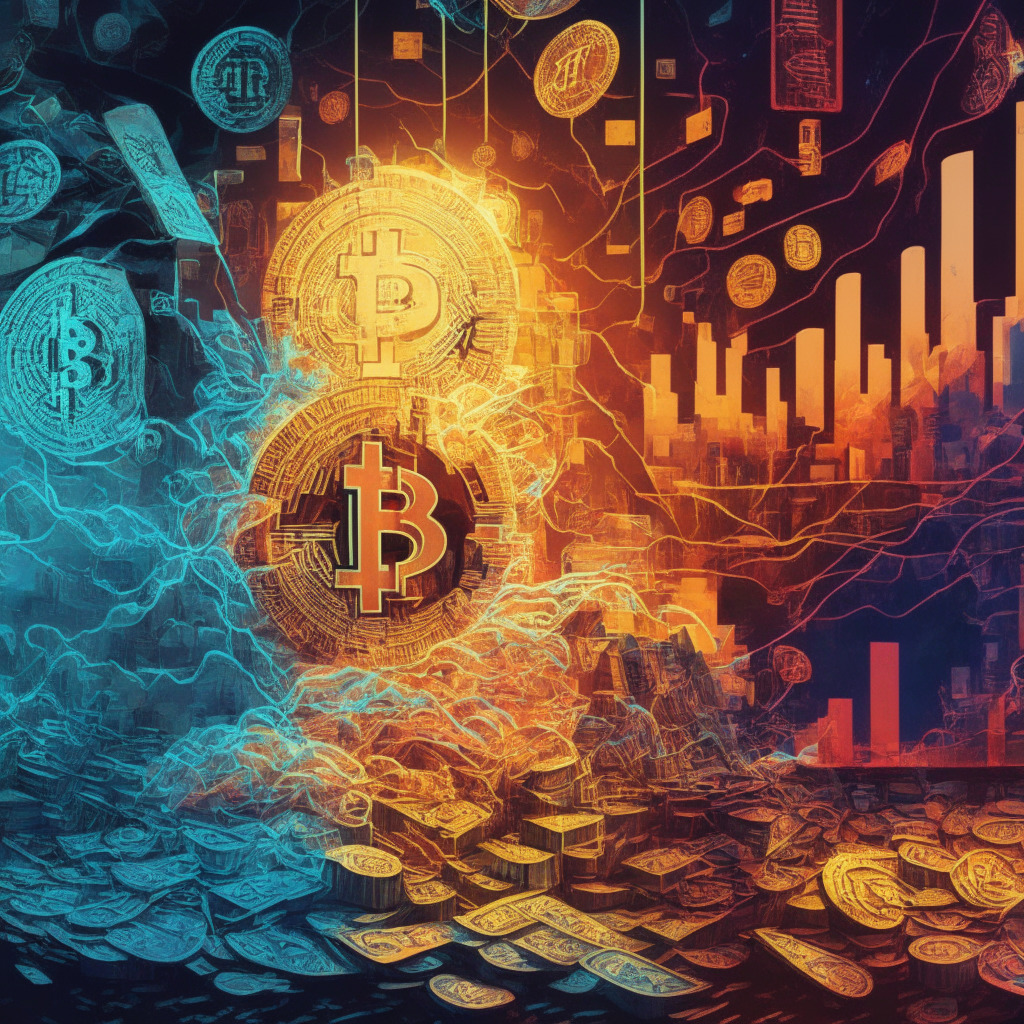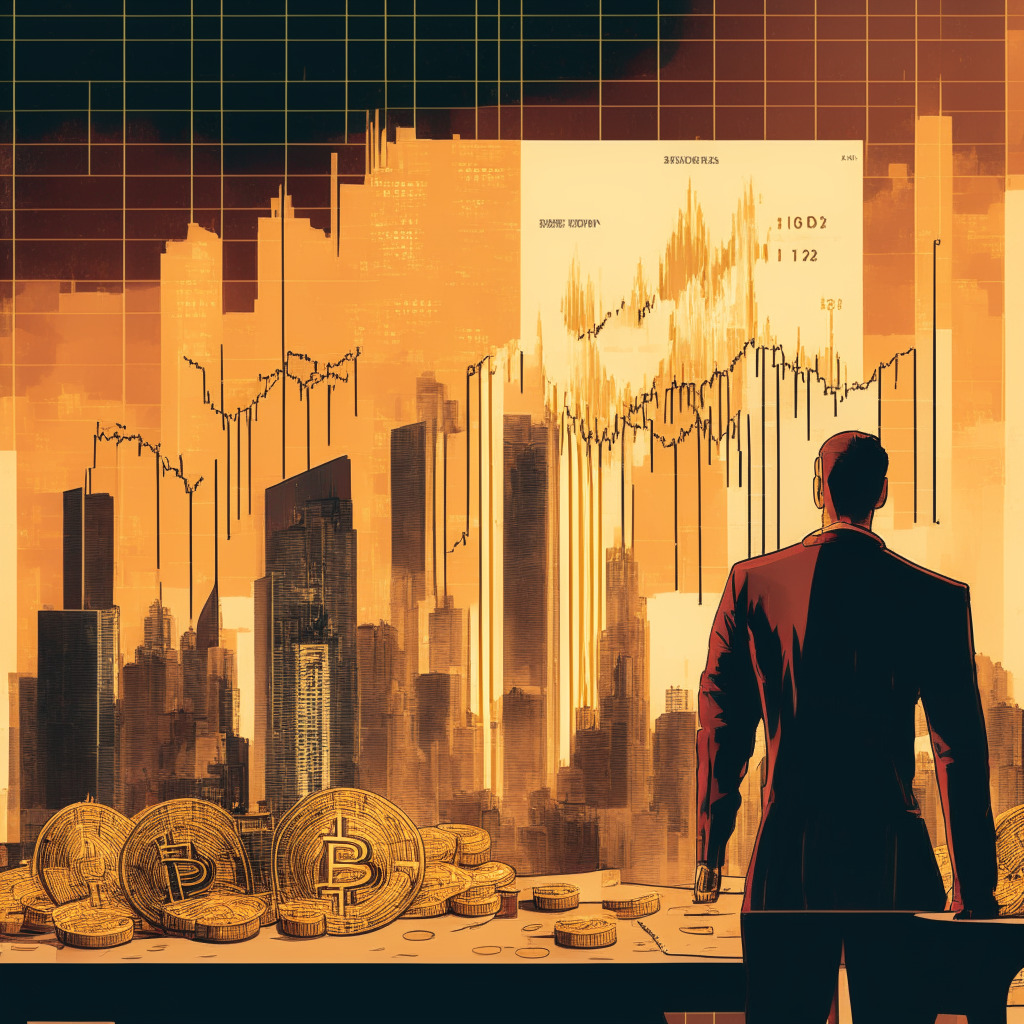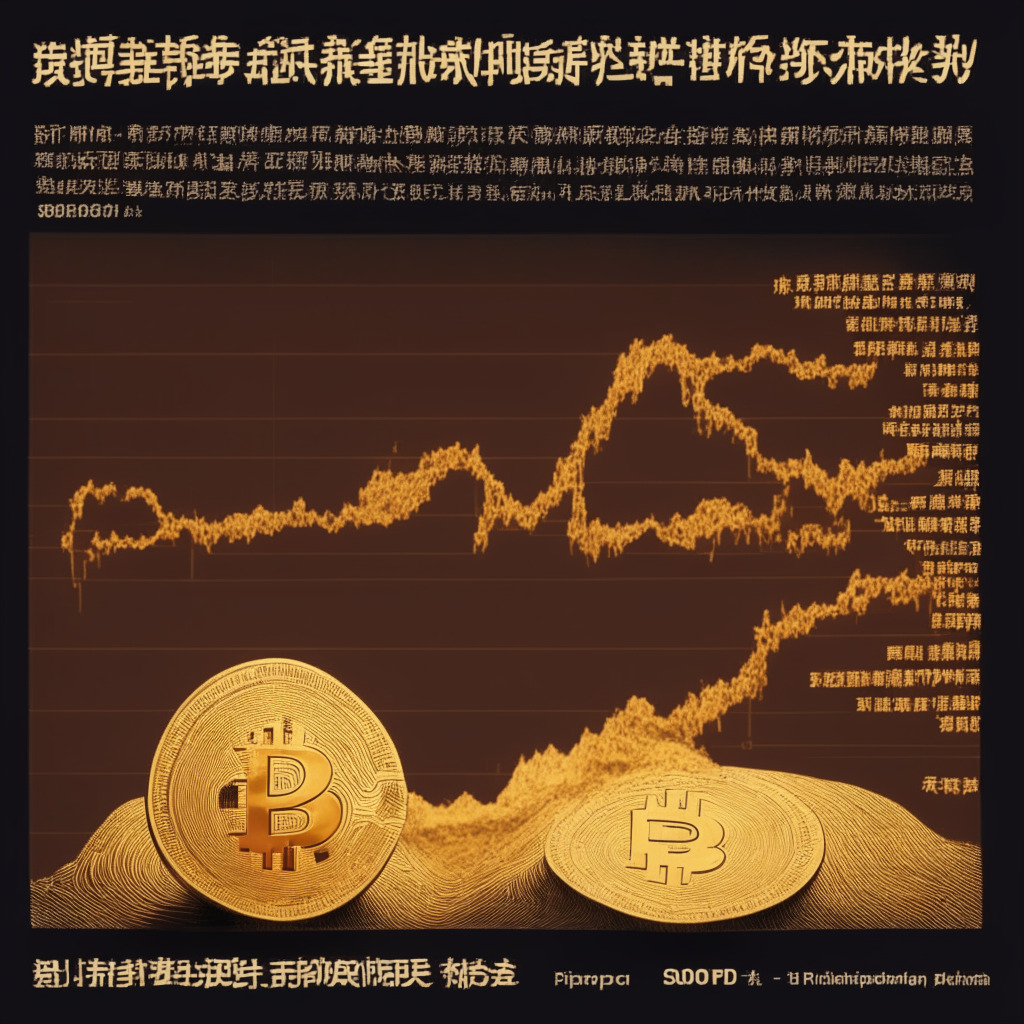Cryptocurrencies recently experienced a shocking mid-afternoon dip, with altcoins like Ripple, Dogecoin, Polkadot, Polygon, and Uniswap losing over 4%. This downturn may be linked to strong U.S. retail sales data, which sparked fears of increased central bank tightening.
Search Results for: S&P Global
Impending Bitcoin Boom? Examining Market Signals and Global Economic Factors
“A decline in Bitcoin’s short-term holders and record-low volatility could suggest an impending bull market. A recent report indicates this narrow trading range has happened only twice in Bitcoin’s history, prompting speculation about significant market movement. However, these indicators don’t guarantee outcomes with shifting global economic conditions.”
Crypto Market Trends amid Global Economic Unrest: Analysis and Predictions
“Bitcoin remains largely stoic amid economic news, displaying resilience to external influences. Despite stagnancy in the market, optimism remains high due to the potential influx of new users and capital driven by enhanced applications on Ethereum and an evolving crypto-economic landscape.”
Bitcoin: An Unfazed Giant Amidst Global Financial Waves
“Bitcoin shows a different trend compared to the global financial markets. Despite soaring stock indices, and whispers about the end to rate hikes, Bitcoin remains independent. This indifference seems to isolate Bitcoin, leading some to foresee the odds of Bitcoin tumbling towards $25,000-$26,000.”
Canton Network: Financial Giants Unite for Blockchain Revolution and Web3 Challenges
Canton Network, a blockchain technology supported by financial giants like Deloitte, S&P Global, and Moody’s, aims to revolutionize financial markets using Web3 infrastructure. Offering decentralized services to increase transaction efficiency, it faces challenges such as data privacy, control concerns, and scaling limitations. The network seeks to test interoperability starting July, emphasizing its potential in asset tokenization and improved global trading efficiency.
Cryptocurrency’s Relationship with Macroeconomic Factors: Pros, Cons, and Future Impacts
Cryptocurrency markets remain responsive to macroeconomic changes despite being driven by technology and market sentiment, according to an S&P Global report. As interest from institutional investors grows, the relationship between crypto markets and macroeconomic indicators may strengthen, heightening contagion risks between traditional and crypto markets while also raising important questions about their future roles in global economies.
The Crypto Market Debate: Are Digital Assets Truly Independent from Economic Factors?
S&P Global’s report reveals that crypto markets are not entirely insulated from broader economic influences, with increased financial stress and market volatility impacting crypto prices. This raises questions about the potential contagion risk between traditional finance and the cryptocurrency market, as well as how monetary policies affect digital asset trends.
Unraveling the Complex Relationship Between Crypto and Traditional Finance
The S&P Global report reveals a complicated relationship between the crypto ecosystem and traditional finance due to unique factors driving cryptocurrencies. Analyzing crypto assets’ performance during expansionary monetary policies, recessions, and inflation highlights the influence of geography, idiosyncrasies and exceptional events, complicated further by increasing institutional adoption.
Cryptocurrencies as Inflation Hedge: Theoretical Appeal but Lacking Data
S&P Global highlights cryptocurrencies as potential inflation-protective assets, particularly in emerging markets. However, the agency emphasizes the insufficient data to support this claim, urging investors to approach the topic with skepticism and consider factors like crypto’s sensitivity to interest rates in financial decisions.
Stablecoin De-Pegging: A Deep-Dive into USDC and DAI Performance versus USDT and BUSD
“Analysts reveal ‘de-pegging’ is more common in stablecoins USDC and DAI compared to Tether and Binance USD. While stability ideally requires good governance, collateral and reserves, market confidence and adoption, USDT has shown steadiness despite mainstream scrutiny.”
FCA’s Crackdown on Crypto Inflation Hedge Claims: Debate and Implications on UK’s Market
The UK’s Financial Conduct Authority (FCA) proposes new rules targeting claims that cryptocurrencies can act as inflation hedges. The FCA urges caution, citing limited data on crypto performance during high inflation and inherent volatility. The rules aim to encourage responsible promotion and are set to take effect on October 8.
Cryptocurrencies and Macroeconomic Factors: Contagion Risk or Tailwind? Debating Pros and Cons
Cryptocurrencies may not be immune to macroeconomic factors, with market volatility having the most significant influence on prices. Despite fluctuations, Bitcoin consistently retains value, reinforcing its appeal as a distinct asset class among investors. However, vigilance is needed as the economic landscape evolves.
Canton Network: Revolutionizing Finance or Privacy Concerns Looming? Pros & Cons Explored
Digital Asset recently announced plans to launch the Canton Network, a privacy-enabled interoperable blockchain network for institutional clients. Backed by major industry players, this decentralized infrastructure aims to interconnect applications, streamline cross-chain transactions, and address privacy, decentralization, and compliance concerns within the financial market.
Geopolitical Tensions: Unpredictable Influence on Financial Assets and the Crypto Market
“The escalating tensions between Israel and Hamas are affecting global financial markets, causing a decline in emerging stocks and cryptocurrencies, and a surprising uptick in traditional safe havens like oil and precious metals. Amid this turmoil, global economies are grappling with high oil prices and inflationary pressure, while the long-term effects are yet to be seen.”
Bullish Moves: Top Altcoins Poised to Break Resistance; A Detailed Crypto Market Outlook
“The crypto market outlook brightens as major altcoins like BTC, ETH, BNB, ADA, and SOL attract attention. However, while trading these digitized assets, crypto pioneers suggest ensuring safety, conducting meticulous research before making investment or trading moves.”
Unraveling the Crypto Paradox: Bitcoin’s Resilience and Rising Star Minetrix Amid Economic Chaos
Despite economic turbulence, Bitcoin is showing signs of strength, bouncing back to the $27k mark. Amidst this, Bitcoin Minetrix ($BTCMTX), the first stake-to-mine platform is attracting attention, offering retail investors a simplified entry into bitcoin mining and a unique wealth creation tool.
Navigating the Bullish Tides: XRP Resilience and New Investment Opportunities in Presale Tokens
Despite experiencing a 0.5% dip, XRP retains a year-to-date markup of 47.7%, demonstrating resilience amidst market adversities. An upswing in trading volumes and the relative strength index moving towards 50 hint at an overdue rebound. However, any high-risk crypto investment should be approached cautiously and within an individual’s financial capacity.
Dollar Strength Index Surge: Examining its Potential Impact on Bitcoin’s Future
The Dollar Strength Index (DXY) reaching a 10-month high has implications for the cryptocurrency world, particularly Bitcoin. However, this doesn’t necessarily indicate a direct impact on Bitcoin’s performance. Amidst potential inflation and recession risks, an increase in the money supply could inadvertently favor Bitcoin in the long term.
Bitcoin and the US Consumer Debt – A Perfect Storm Brewing or a Miscalculated Risk?
“The mounting US consumer debt could provide an advantage for Bitcoin’s price amid an evolving economic landscape. While consumers expend the surplus savings built up during the pandemic, threats of inflation loom. Amid these uncertainties, cryptocurrency, particularly Bitcoin, may see influences in its trajectory.”
Navigating Uncertainty: Evaluating Contributing Factors to Crypto Market’s Recent Slump
“Recent market dynamics show a significant decrease in the total crypto market valuation over a span of 10 days. Contributory factors include rising interest rates, increasing finance costs, a decrease in consumer spending, and a liquidation of investments. Nevertheless, expert analysis suggests possible economic resilience and a diminished likelihood of a long-lasting recession. At the same time, regulatory pressure and heavy offshore trading stirs controversy in the crypto industry.”
Analyzing Bitcoin Market Fluctuations: Impacts, Future Prospects, and Resiliency Amid Recession
“In his analysis, Mike Colonnese discusses recent Bitcoin (BTC) market fluctuations, attributing the sharp drop to SpaceX’s decision to devalue its BTC holdings and concerns sparked by Evergrande’s bankruptcy. He also outlines potential future trends, including possible boost in BTC prices if the Federal Reserve cuts rates amidst a recession, and impact of upcoming halving event in 2024.”
Bitcoin’s Slump Below $26,000: Macroeconomic Factors and The Uncertain Future of Cryptocurrencies
Bitcoin’s recent slump mirrors an overall downturn in the crypto market, influenced by stricter monetary policies aimed at curbing inflation. Despite these challenging conditions and financial uncertainty, the potential introduction of US Bitcoin and Ether futures exchange-traded funds could provide a robust catalyst for the industry.
Emerging Altcoins Defy Bearish Trends: The Thin Line Between Skepticism and Optimism
“In a bearish market, few altcoins like HBAR, OP, INJ, and RUNE show potential growth opportunities, displaying resilience. Despite declining Bitcoin value and broader market trends, these altcoins demonstrate strength through robust support levels or continued growth, indicating potential upside momentum.”
Navigating Through the Storm: China’s Deflation and Impact on Bitcoin’s Future
China’s economic downturn has sparked concerns over potential negative impacts on Bitcoin and other growth-dependent assets. With the onset of deflation, falling prices could amplify debt burdens, stifling spending and investments. These economic shifts underline the need for stakeholders, particularly those invested in Bitcoin, to move forward carefully.
Bitcoin vs Traditional Assets: Insight from Downgraded US Debt and Crypto’s Market Stand
“Unlike the 2011 market panic, the crypto market now seems fairly calm following the US Government debt downgrade. Bitcoin’s maturity as an asset class has resulted in better correlation to global events. The digital asset market continues to offer potential amidst transformative moments, despite uncertainties like the Ripple vs SEC conflict.”
Fitch Downgrades US Credit Rating: An Opportunity or Threat for Cryptocurrencies?
Fitch has downgraded the US government’s credit rating from AAA to AA+, sparking concerns of potential impact on the cryptocurrency market. Crypto enthusiasts suggest this demonstrates weakening traditional economic structures, advocating a transition to decentralized financial systems utilizing cryptocurrencies like Bitcoin and blockchain technology.
Cryptocurrency’s Rollercoaster: Bitcoin’s Slump and the Potential Rise Ahead
“With a recent downward trend, questions emerge on whether Bitcoin (BTC) can maintain key support margins. Yet, long-term macro factors and Bitcoin’s historic correlations with the US stock market and US dollar hint at potential market value upsurge. The reimagining of Bitcoin as a safeguard against inflation, depicted by CoinMetrics.com’s charts, contributes to this paradigm shift.”
China’s PPI Influence and Its Effect on Bitcoin’s Stability Above $30,000
Bitcoin’s stability above $30,000 aligns with signs that the liquidity-tightening cycle that started last year, affecting cryptocurrencies among other risk assets, is about to end. This is suggested by China’s recent Producer Price Index (PPI) data indicating expanding deflationary pressures globally.
Navigating Crypto Volatility and Economic Optimism in a Changing Financial Landscape
“Bitcoin and other digital assets’ responses to global financial changes highlight a likely significant surge by 2023. Notable financial giants are entering the Bitcoin ETF sphere, triggering fluctuations. Amid worldwide central bank interventions and a potential influx of traditional firms, even in bear market conditions, there’s a burgeoning acceptance of crypto in mainstream finance.”
Rising US Treasury Yields: Impact on Bitcoin and Deciphering Mixed Market Signals
US Treasury bonds’ rising yields spark questions about their impact on Bitcoin price, as the cryptocurrency seemingly decouples from its typical inverse correlation with bond yields. Amid higher inflation expectations, investors seeking safety in government bonds face growing global recession risks, leading to uncertainties in navigating the relationship between Bitcoin, inflation, and government bonds.
Debt Ceiling Deal Impact: Crypto Stability Amid Recession Fears
Positive market sentiments in global stock and crypto markets follow the Biden-McCarthy Debt Ceiling Deal and U.S. Federal Reserve’s potential interest rate decision. However, risks remain for volatile assets like cryptocurrencies due to uncertain macroeconomic conditions, regulatory challenges, and weak technical charts. Conduct thorough research before investing in cryptocurrencies.
US Default Averted: Market Optimism Fuels Crypto Rally and Debate on Future Prospects
US futures surged on Thursday as the House of Representatives passed a crucial deal averting a dangerous US default. Combined with hints of a pause in interest-rate hikes, this sparked optimism in the market. Positive trends were observed in S&P 500, Dow Jones Industrial Average, and Nasdaq Composite futures, while tech-heavy Nasdaq experienced a slight setback. The broader cryptocurrency market may also be impacted by this development.































